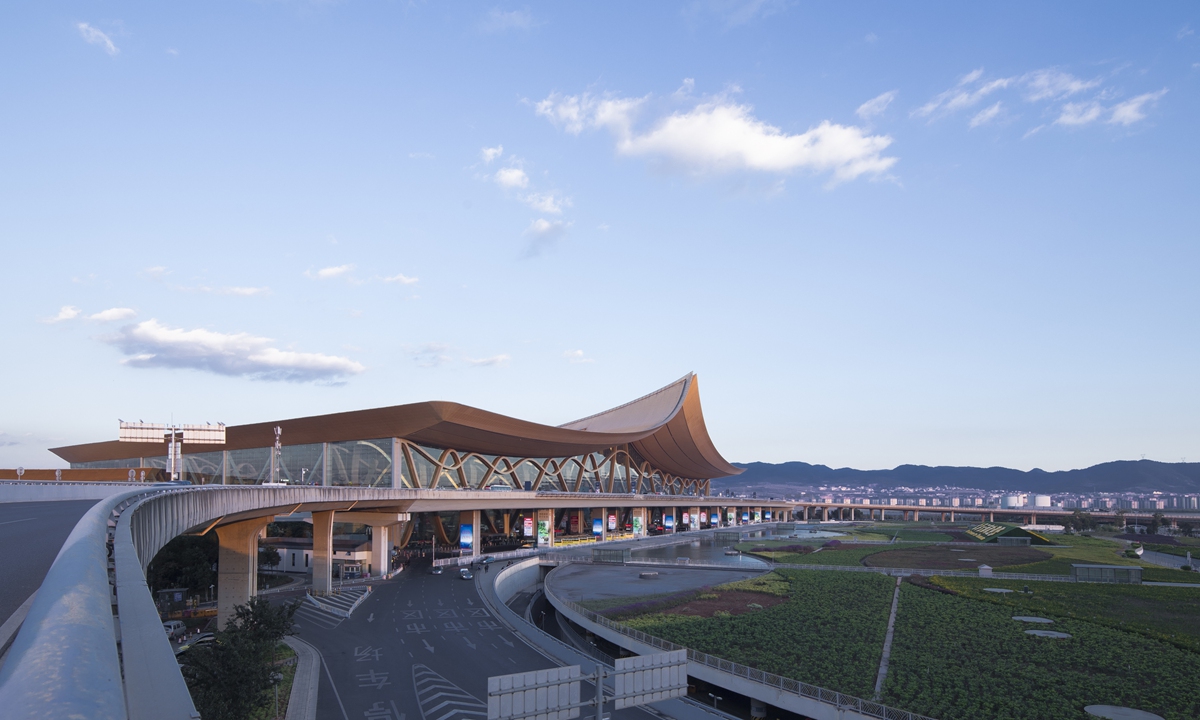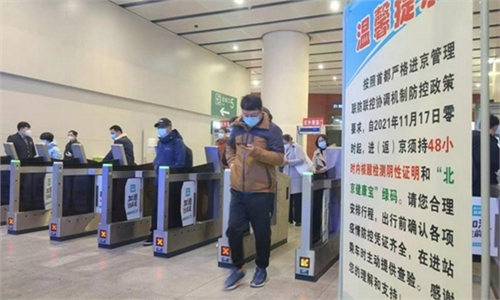
Kunming Changshui International Airport in Southwest China's Yunnan Province Photo: IC
Rising international ticket prices have triggered a new round of crackdowns, with yet another embassy taking measures to curb skyrocketing airfares while also strengthening the supervision of ticket sales channels.
The Chinese Embassy in Laos confirmed on Tuesday that it had summoned airlines, and required them to set fares within a reasonable range based on flight route, flight time, operating costs, and frequency of flights, and urged them to guard against intermediary agents at all levels exploiting desperate consumers by imposing malicious price hikes.
The embassy said the move came after new COVID-19 cases in Laos recently intensified, and commercial flights between China and Laos were suspended, meaning the number of flights to China has decreased, with some agents raising fares, greatly inconveniencing passengers.
Lao Airlines stated that it attaches great importance to the Embassy's guidance. It has suspended the sales of some air ticket agents found to be engaged in price gouging and will fully adopt a direct sales model from February onward.
Currently, direct-sales ticket prices for Vientiane to Kunming flights on Lao Airlines are within a regular market price range, which is about 20 percent floating according to market conditions, the carrier said.
Data from information provider VariFlight shared with the Global Times on Wednesday showed that currently, Lao Airlines has revoked tickets sold to agents, and there are no flight tickets being sold via the official website of Lao Airlines before January 30, 2022.
It is the second embassy which has intervened to prevent unchecked price gouging since the outbreak of the pandemic. Prior to this, even the Civil Aviation Administration of China (CAAC), which has direct supervision over airlines and routes, had not precedent for providing direct guidance to airlines over reduction of ticket prices.
On November 24, the Chinese Embassy in the Philippines issued a notice addressing the operation and management of the airlines bound for China, with a focus on making tickets more affordable.
The embassy said the move is not directly aimed at setting the market through administrative means, but to protect the welfare of passengers often seeking to return home to China.
Market insiders attributed to the soaring price to restricted supply, with number of flights well below pre-pandemic levels, while also being subject to temporary suspensions based on the number of imported cases detected at the Chinese border.
In the new flight season which began at the end of October, the number of international flights to and from China has further decreased compared with the previous season, with the main reduction centered on short-haul routes in Southeast Asia.
Meanwhile, with many countries in Southeast Asia still struggling with the pandemic, there have been suspensions to a number of popular routes. For example, Spring Airlines' Bangkok and Singapore routes have been suspended during the new season.
Apart from the Philippines, return routes from other countries are also witnessing increasing sales by agents with the price of air tickets to China continuing to rise.
News portal yicai.com reported on Wednesday that the price ticket of one-way economy class from Istanbul to Guangzhou, South China's Guangdong Province exceeded 200,000 yuan ($31,391), with a business class ticket costing over 250,000 yuan.
Economy class fares are now more expensive than the cost of a seat on a private jet during the earlier stages of the pandemic.
In the first half of 2020, when the CAAC still allowed business jets to operate return flights to China, the price of each seat could be up to 180,000 yuan.
It is worth noting that price gouging whether by airlines selling economy or business fares, or agents inflating margins well above the market rate are both violations of orders issued by CAAC. During periods when supply and demand are not so tight, airlines will release discounted prices on the basis of full-price tickets.
However, CAAC has no final say over foreign airlines' soaring ticket prices.
In April last year, a spokesperson for the CAAC Liu Lusong stated that the implementation of China's international air freight rates was in accordance with agreements signed between the Chinese government and relevant countries, which means that air fares for international routes from European and American countries to China are mainly determined by market demand.
He suggested that it is better for passengers to purchase air tickets through legal channels, and in cases prices seem unreasonably high, that passengers can lodge a complaint with the national market management department.


